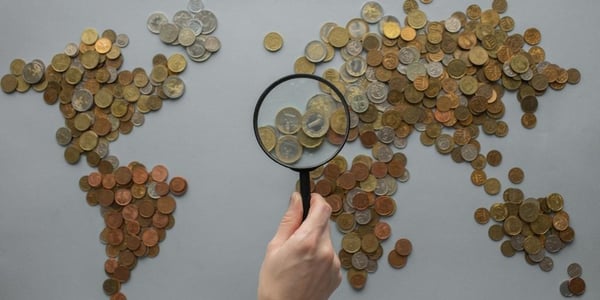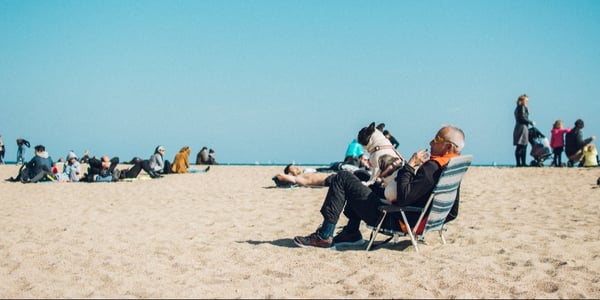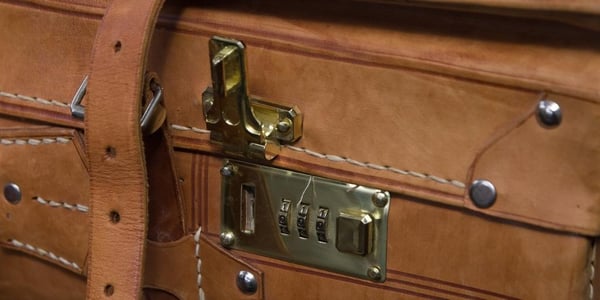Traveling is a wonderful way to explore new destinations, experience different cultures, and create...


Traveling is a wonderful way to explore new destinations, experience different cultures, and create...

Holiday vacations are a fantastic way to wrap up the year by taking a break from reality to clear...

Life always carries risk. This is especially true for traveling and traveling when 55+ is riskier...

With age, traveling can become more challenging, but it doesn't have to stop you from exploring new...
15 Tourist Traps and Scams to Avoid When Traveling in Europe
Europe has long been a dream destination for retirees seeking to explore its rich history, diverse cultures, and picturesque landscapes. However, amidst the charm of Europe's cities and countryside, there are tourist traps that can detract from the authentic travel experience. In this blog, we'll highlight some popular tourist traps to avoid while traveling in Europe. Avoid these pitfalls to make the most of your trip and immerse yourself in the genuine charm of the continent.
Watch Out for These Popular European Tourist Traps!
1. Overpriced Restaurants in Touristy Areas
One of the most common tourist traps in Europe is the prevalence of overpriced restaurants located in tourist areas. These establishments often rely on a steady stream of visitors to maximize their profits without necessarily delivering exceptional quality or authenticity. Tourists may find themselves paying exorbitant prices for dishes not representative of the region's culinary traditions.
Additionally, restaurants in heavily touristed areas may alter their menus to cater to international tastes, diluting the authentic flavors of local cuisine.
To avoid falling for this trap, research restaurants in advance, read reviews from locals and other travelers, and seek out eateries off the beaten path. Venturing into smaller neighborhoods or ask for recommendations from locals to discover hidden culinary gems that offer genuine and delectable dishes at more reasonable prices.
2. Pushy Street Vendors
Street vendors are frequently spotted in popular tourist destinations across Europe. While many vendors sell genuine products and souvenirs, some can be pushy and employ aggressive sales tactics to persuade tourists to make purchases. They might use charm, flattery, or even guilt to encourage visitors to buy their wares, which may be overpriced or of inferior quality.
Practice assertiveness and politely decline offers they are not interested in. It's important to set boundaries and remember that saying "no" is perfectly acceptable if a product or service does not align with your preferences or budget.
Instead of engaging with pushy street vendors, focus on exploring local markets and independent stores where you can find unique and authentic products, interact with artisans, and support the local economy directly. These experiences offer a more genuine connection with the destination, often leading to meaningful interactions with locals.
3. Time-Share Presentations
Time-share presentations are a typical tourist trap to be cautious about when traveling in Europe. These presentations often lure travelers with promises of free gifts, meals, or discounted tours, but the primary objective is to sell time-share properties or vacation club memberships.
During these presentations, high-pressure sales tactics are frequently employed to convince attendees to make hasty decisions about investing in a time-share property. The sales representatives may use persuasive techniques, such as limited-time offers or exclusivity claims, to create a sense of urgency.
It is recommended to decline any invitations or deals that seem too good to be true to avoid falling victim to time-share presentations. Legitimate travel companies and reputable tour operators do not require attendees to attend such presentations to receive benefits. If you are interested in purchasing a time-share or vacation membership, you should conduct thorough research, seek independent advice, and never feel pressured into making a decision on the spot.
4. Fake "Skip-the-Line" Tickets
Scams involving fake "skip-the-line" tickets are prevalent in popular European tourist destinations. These fraudulent tickets are often sold online through unofficial channels or by unauthorized street vendors. Tourists are enticed by the idea of bypassing long lines at famous attractions, but in reality, they may waste time and money.
Using fake "skip-the-line" tickets can lead to disappointment, as you might be denied entry at the attraction or face additional fees to purchase valid tickets. To avoid this, =only purchase tickets from authorized ticket vendors, the official attraction's website, or reputable travel agencies. It's wise to check for customer reviews and verify the legitimacy of the ticket seller before making any purchases.
5. Unlicensed Tour Guides
Unlicensed tour guides can be found in many tourist destinations across Europe, offering their services at lower rates than licensed guides. While the appeal of cost savings might be tempting, using unlicensed guides can result in subpar experiences and inaccurate or misleading information.
Licensed tour guides undergo training and examinations to ensure they possess in-depth knowledge of the region's history, culture, and landmarks. They provide valuable insights and enhance the overall travel experience by offering expert commentary and access to lesser-known facts.
Prioritize safety and quality by choosing licensed tour guides who carry official identification and are recognized by reputable tour associations or local tourism boards.
6. Pickpocketing Hotspots
Pickpocketing is a significant concern in many European cities, especially in crowded tourist areas. Pickpockets often target tourists who may be perceived as more vulnerable or distracted. Typical pickpocketing hotspots include busy public transportation stations, popular tourist attractions, crowded markets, and busy streets.
To protect yourself from pickpocketing, always be mindful of your belongings. Wearing crossbody bags or anti-theft backpacks and keeping wallets in front pockets or hidden pouches can deter pickpockets. It's also essential to avoid displaying valuable items like expensive cameras or jewelry openly.
Additionally, you should familiarize yourself with the common pickpocketing techniques, such as distractions, bump-and-run, or staged accidents.
7. Exorbitant Currency Exchange Rates
Currency exchange kiosks at airports, train stations, and popular tourist areas often offer less favorable rates and charge higher fees than banks or local exchange offices, resulting in travelers receiving significantly fewer euros for their money during the currency exchange process.
It is advised to research and compare currency exchange options before your trip. Banks or reputable exchange offices usually offer more competitive rates and lower fees. Alternatively, you can withdraw cash from ATMs using debit or credit cards with favorable exchange rates and minimal foreign transaction fees.
Using credit cards with no foreign transaction fees for purchases can also be beneficial. However, informing one's bank about the travel plans beforehand is important to avoid potential card restrictions while abroad.
Want to start traveling more? Click here or the button below to download the 50+ Travel: The Why, Where, and How eBook!
8. "Free" Tours
While "free" walking tours might sound enticing, they often come with hidden costs or rely heavily on tips to sustain the guides' income. Tour guides on these "free" tours may pressure tourists to tip generously, creating an uncomfortable situation for those on a budget.
Be aware that these "free" tours may not provide the same level of quality or expertise as paid tours. Tour guides may lack formal training, and their knowledge of the city's history and culture might be limited.
Click here or the button below to apply online for a TopLine Financial Credit Union credit card!
9. Seasonal Price Surges
Europe experiences significant fluctuations in tourist activity throughout the year, resulting in seasonal price surges for accommodation, flights, and attractions. Peak tourist seasons, such as summer and major holidays, attract higher demand, leading to inflated prices and crowded tourist destinations.
To mitigate the impact of seasonal price surges, consider traveling during the shoulder or off-peak seasons. Not only are prices more reasonable during these times, but there are also fewer crowds, allowing for a more relaxed and enjoyable experience. Spring and autumn, in particular, offer pleasant weather and vibrant landscapes without the peak-season price tags.
Moreover, you can plan your itinerary strategically to avoid visiting the most popular destinations during peak periods. Exploring lesser-known but equally enchanting towns and cities can provide a more intimate and immersive travel experience.
10. Unnecessary Souvenir Purchases
Souvenir shops are prevalent in European tourist areas, offering a wide array of trinkets, memorabilia, and souvenirs. While bringing home mementos from the trip can be tempting, unnecessary souvenir purchases can lead to excessive spending and clutter.
To make thoughtful and meaningful souvenir choices, consider items that truly capture the essence of the destination and hold personal significance. Handcrafted goods, traditional artwork, or locally produced products are often more meaningful and authentic than mass-produced souvenirs.
Before making a purchase, take a moment to reflect on whether the item will have lasting value and relevance once they return home. Focusing on quality over quantity will ensure that souvenirs become cherished reminders of the trip rather than forgotten trinkets.
11. Fake Artisan Markets
Fake artisan markets are a common tourist trap in many European cities. These markets may claim to sell handmade, locally crafted goods, but in reality, some of the items are mass-produced or imported from other countries. Tourists may be lured in by the promise of unique and genuine souvenirs, only to discover that they purchase generic items lacking cultural value.
To avoid this trap, be discerning when shopping at artisan markets. Look for signs of authenticity, such as locally made goods, unique designs, and the presence of artisans actively crafting items at the market. Engaging with local vendors and asking about the origin of the products can also help ensure that the souvenirs purchased are genuinely crafted by local artisans.
12. Tourist Trap Hotels
Tourist trap hotels are accommodations that capitalize on their proximity to famous landmarks or tourist attractions. These hotels may advertise themselves as being at the heart of the action but often charge inflated prices for rooms that may not match the promised quality.
Be cautious when booking hotels near major tourist spots and iconic landmarks. Researching reviews and ratings from previous guests can provide valuable insights into the hotel's quality and service. Additionally, consider the hotel's distance from the attractions you want to visit, as it may be more worthwhile to stay slightly further away in a quieter neighborhood and use public transportation to access the main sights.
One way to avoid this trap is to explore hotels in less touristy areas that offer easy access to the city's attractions. Reading reviews from fellow travelers who prioritize comfort, cleanliness, and personalized service will help you find accommodations that suit your needs and expectations.
13. Unregulated Taxi Services
Unregulated taxi services are a common concern in some European cities, especially those with high tourist traffic. These services may not adhere to the same safety and quality standards as licensed taxis, putting tourists at risk.
Use caution when hailing taxis from the street, as unregulated drivers might overcharge, use unapproved meters, or take unnecessarily long routes to inflate fares. Additionally, some unregulated taxis may not have proper insurance or meet safety requirements, posing potential risks during the journey.
Opt for licensed taxis or use reputable ride-sharing apps. Licensed taxis typically have clear markings, a visible license number, and a meter that starts at a fair rate. Using official taxi stands or booking through well-known ride-sharing apps ensures transparency in pricing and a safer travel experience.
14. Impersonators and Street Performers
In popular tourist areas, you may encounter impersonators dressed as famous characters or street performers showcasing their talents. While some of these encounters can be entertaining and enjoyable, others may be pushy or demand payment for posing for photos.
If you wish to take photos with performers, it's advisable to negotiate and agree on a fair price beforehand to avoid any unpleasant surprises.
Rather than focusing solely on impersonators and street performers, take the time to appreciate authentic local talent and cultural performances. Attending traditional music shows, dance performances, or theater productions provides a more genuine and immersive experience that contributes to a deeper understanding of the local culture.
15. Misleading Photo Opportunities
In some tourist destinations, you may come across photographers offering to take pictures at scenic spots or famous landmarks. While these photographers might appear friendly and helpful, they may have ulterior motives. After taking photos, they might charge exorbitant fees or pressure tourists to make purchases.
Clarify the cost of the service upfront and confirm whether there are any additional charges for the photos taken. If you are uncomfortable with the photographer's pricing or approach, decline the service and take your own photos using smartphones or cameras.
Alternatively, you can ask fellow travelers or passersby to take your photo as a friendly and cost-effective option. Additionally, using a selfie stick or a tripod can provide a convenient way to capture beautiful memories without relying on unknown photographers.
When you travel to Europe, avoiding common tourist traps can enhance your travel experience and foster a deeper connection with the continent's rich heritage. Embracing a curious and adventurous spirit while staying vigilant against potential pitfalls will undoubtedly lead to a fulfilling and rewarding journey through Europe. Happy travels!
Click here or the button below to learn more about fraud prevention at TopLine Financial Credit Union.
Living50+